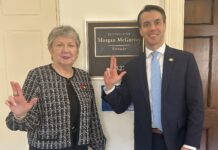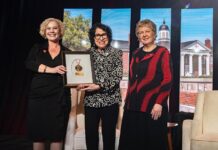
A program aimed at addressing teacher shortages is the result of a partnership with UofL’s College of Education and Human Development and the Ohio Valley Educational Cooperative (OVEC), a consortium of 15 school districts in north central Kentucky.
The OVEC Teacher Residency Program (OVEC-TRP) offers college graduates with a degree other than education the opportunity to earn a master’s degree and teaching certification in one year, in exchange for their commitment to teach in schools within participating districts. Reaching minority candidates to help diversify classrooms is a focus of the program.
The initiative follows the success of the Louisville Teacher Residency program in partnership with Jefferson County Public School’s Division of Diversity, Equity, and Poverty, now in its second year. OVEC-TRP hopes to build the impact on schools in districts throughout the Ohio Valley Region.
“We are thankful for our partnership with Jefferson County and OVEC districts,” said Stefanie Wooten-Burnett, clinical assistant professor and Director of Multiple Pathways for Teacher Certification in the College of Education and Human Development. “We know our teacher residency model is effective in recruiting diverse teachers, and now we have the opportunity to implement the model in more schools throughout the region.”
Beginning this summer, 18 candidates will begin the OVEC-TRP program, funded in part through a grant from the Kentucky Council on Postsecondary Education. The grant will pay for half of a student’s graduate tuition, stipends for mentor teachers in OVEC schools, test preparation materials and payment for books and other materials. Districts determine salaries and additional support for program participants during their year of residency.
“Creating an inclusive environment in Kentucky classrooms is critical to building a diverse and culturally-competent workforce, and that starts with our educators,” said CPE President Aaron Thompson. “Increasing the number of teachers from underrepresented groups, as part of our work to eliminate disparities in education, will strengthen our communities and economy.”
The program is unique in its emphasis on the codesign of coursework to meet the needs of districts.
“We call them District Supported Learning classes,” said Wooten-Burnett. “We partner with district personnel to design content for coursework, so the curriculum is tailored specifically to their respective needs.”
Matching teacher-to-student demographics in rural schools is a task of increased focus and attention for administrators, particularly as teacher shortages are increasing nationally.
“Our goal from the beginning has been to remove barriers,” Wooten-Burnett said. “This is about recruiting and retaining minority candidates who want to work in schools with the goal of removing barriers to help them be successful as teachers.”


































